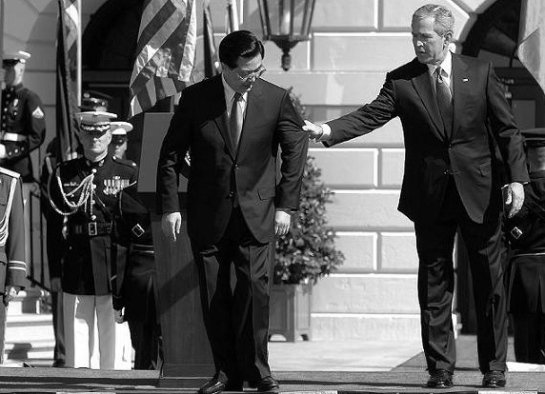US-China Relations in the Bush Era – Strategic Partners or Competitors?

In this essay, the author reviews the Sino-US relationship during the George W. Bush administration. Specifically, this paper discusses whether or not the countries should be viewed as strategic partners or competitors.
This article originally posted on InPEC Magazine By Anna Rabin, 1 February, 2012
Whilst fluctuating during the early stages of George W. Bush’s presidency, China and the United States (US) maintained a fairly stable strategic partnership throughout the two terms of the Bush administration. The idea of a strategic partnership was advocated through the signing of the Sino-US Joint Statement during the presidencies of Bill Clinton and Jiang Zemin. The document set the foundations for the two countries to ‘work together to set up a constructive strategic partnership.’ This essay will discuss the transition in the Sino-US relationship from Clinton to Bush and the status of the relationship throughout Bush’s presidency.
Bush’s electoral campaign stance on China will initially be reviewed. An analysis of Bush’s electoral campaign characterisation of China as a strategic competitor of the US will then be provided. The September 11th terrorist attacks will then be extensively analysed. The ways in which the attacks acted as a catalyst for a sustained Sino-US strategic partnership throughout the rest of the Bush administration will be discussed. The US’s preoccupation with terrorism, which allowed China to assume a more prominent role within the Asia Pacific, will then be discussed.
This increased role was allowed in spite of Sino-US tensions surrounding Taiwan’s sovereignty. Sino-US co-operation on the issue of North Korea’s nuclear weapons will be seen as a source of creating a more stable relationship between the two countries. The growing economic interdependence between the two countries and the stabilising impact that this has had on the Sino-US strategic relationship will also be examined. This essay will provide an extensive discussion that will demonstrate the relatively stable Sino-US strategic relationship that occurred during the Bush administration.
Whilst principally a foreign policy concern, the Sino-US strategic relationship figures prominently in US domestic politics. Since a diplomatic relationship was formed between the two countries in 1979, Sino-US relations have become an important policy platform in US presidential elections. US foreign policy towards China is a key area in which a presidential candidate can differentiate themself from their competitors and predecessors. The trend has been however, that once elected, the new administrations’ policy towards China is then moderated.
Political scientist Yu Wanli believes that the Sino-US relationship is influenced by small cycle and big cycle politics. The small cycle, as with any bilateral relationship is influenced by everyday political discussions. The big cycle, also referred to as the China syndrome, is a trend in which ‘the candidate from the opposition party always brings out and criticizes the China policy of the incumbent administration and makes Sino-US relations the victim of party politics.’ Whilst Wanli asserts that there was a relatively smooth transition from republican President Reagan to republican George H.W. Bush, the big cycle trend that has seen China become a political ‘punching bag’ within US domestic politics was evident during the transition from Bill Clinton to George W. Bush.
During his electoral campaign, Bush, and those who would become key members of his administration, made it clear that they would shift the Sino-US relationship away from the strategic partnership advocated by Clinton. They did this by enacting a campaign that portrayed China as a strategic threat to the US. The Bush administration undertook an ABC (Anything But Clinton) approach to Sino-US relations. Such a campaign was undertaken at a time when voters in the US were becoming disenfranchised with Clinton’s approach to the Sino-US relationship. A 1999 survey conducted by the Gallup Organization, found forty-seven percent of those people surveyed believed that ‘the Clinton administration goes too far in trying to maintain a constructive relationship with China.’
Bush, and the conservative Republicans that surrounded him, therefore set out a foreign policy distinctly different to that of Clinton, one that took a unilateralist stance on issues of security and defence. It must be noted that the vast ideological differences between the one party Chinese communist state and the democratically elected government of the US call into question what exactly a constructive strategic partnership would produce.
Professor of Chinese Studies, David Lampton, used the phrase ‘same bed different dreams’ to characterise the relationship between the two countries during the 1990s. Whilst through the Sino-US Joint Statement, Clinton and Zemin were advocating increased dialogue and improved relations between the two countries, due to their vastly differing ideologies and values, the strategic partnership they talked about would most probably not lead to the two countries becoming allies.
In a speech during the electoral campaign, Bush announced that ‘China should be seen as a competitor, not a partner and treated without ill will but without illusions.’ In the lead up to the election, China’s role within the Asia Pacific region was also addressed by those who would become key members of the Bush administration. Condoleezza Rices declared that she believed that China was a country ‘that would like to alter Asia’s balance of power in its own favor’. These comments were made at a time when Sino-US relations were already tense. A rift in the relationship had occurred after the 1999 bombing of the Chinese embassy in Belgrade by NATO (Northern Atlantic Treaty Organization) forces.
The contentious issue of whether the bombing was as a result of an intelligence error or was a deliberate attack resulted in tension between China and the US near the end of Clinton’s administration. Upon Bush’s election, the bombings, coupled with the April 2001 collision of a US EP-3 aircraft with a Chinese J-8 fighter plane within Chinese airspace, placed the two countries as strategic competitors in the early days of the Bush administration.
Whilst campaigning on the presumption of China as a strategic competitor, the September 11th terrorist attacks dramatically altered the nature of the Sino-US relationship. Under the banner of being united by a common threat, the terrorist attacks gave China a ‘historic, strategic opportunity for peaceful rise’. Whilst China was still being portrayed by the Bush administration as a threat to US hegemony, the US found itself in a position in which it needed to secure strategic partners. The move towards a strategic partnership, however, was not immediate.
The 2001 Quadrennial Defence Report, issued in the aftermath of September 11th made a non-explicit reference to China by stating that ‘[a] military competitor with a formidable resource will emerge in the region’. The aftermath of the terrorist attacks, however, demonstrated that whilst the US would still attempt to hedge against an increasing Chinese power, the two countries could unite on issues deemed strategically important by the US.
Following the September terrorist attacks, China’s President Jiang Zemin personally telephoned Bush to convey his sympathy. In the sign of a long-term strategic commitment, China supported the war in Afghanistan. Their support did not waver even though it required China to put aside its historical sensitivities regarding the Japanese military by allowing their vessels to be positioned in the Indian Ocean.
China also contributed $150 million towards the reconstruction of Afghanistan. Chinese influence also helped the US to overcome anti-American sentiments within the region by pressuring Pakistan to co-operate in the war on terror. China’s co-operation in the War on Terror demonstrated the strongest Sino-US strategic partnership since the election of Bush.
Whilst support for the War on Terror strengthened the Sino-US bilateral relationship, China chose not to support the US led War in Iraq. Although supporting the United Nations Security Council Resolution 1441 that gave Saddam Hussein ‘a final opportunity to comply with its disarmament obligations’, China objected to the US’s unsanctioned invasion of Iraq. Ideologically, China opposed the US’s unilateralist approach to defence.
China advocated that whilst the US approach may have fulfilled the short-term goal of overthrowing Saddam Hussein, undermining international institutions such as the United Nations could lead to chaos. In a 2003 statement, the Foreign Affairs Committee of the Chinese People’s Political Consultative Conference, stated that ‘trampling over the UN Charter and the basic norms of international relations, set a vicious precedent for international relations in the 21st century.’
The ideological differences between China and the US are a major hindrance to improved strategic co-operation between the two countries. Competition between the two countries has also arisen as a result of China’s willingness to source raw materials from countries such as Venezuela, Iran and Sudan. The US sees this decision as ‘undermining Western efforts to promote transparency and human rights.’ China’s decision to provide weapons to Iran and North Korea, countries the US deems to be rogue states, also highlights this point. The US suspicion of China was made public when the 2002 Nuclear Posture Review was leaked. The document specified China as a possible target of a US nuclear attack. Whilst China and the US are ‘still very far apart in political ideology and values’ during the Bush administration they were drawn into partnership by mutual security risks.
Colin Powell, Secretary of State in the Bush administration, stated that whilst ‘a competitor, a potential regional rival’ China must be seen as ‘a trading partner willing to cooperate in areas … where our strategic interests overlap.’ The Bush administration encouraged Sino-US strategic co-operation within the Asia Pacific region. This co-operation was, however, on a conditional basis. Whilst promoting co-operation within the region, the Bush administration made it clear that it intended to maintain hegemony.
Deputy Secretary of State Zoellick reinforced the importance of this point by warning Beijing not to ‘maneuver toward a predominance of power.’ The threat of this occurring has been strongly emphasised within US academic circles. Samuel Huntington stressed that with such a fast rate of both internal growth and expansion, it is inevitable that China will seek hegemony.
The US’s willingness, however, to allow China to shoulder the burden of regional security is on the presumption that China will continue to uphold Deng Xiaoping’s promise of ‘taoguang yanghui (keeping one’s head down)’ therefore not seeking hegemony within the region or the international community. In an effort to quell the fears of the US, the Chinese government released a foreign policy statement of reassurance stating that ‘China did not seek hegemony in the past, nor does it now, and will not do so in the future when it gets stronger.’
In 2006, however, in terms of military spending, China ranked fifth in the world and its yearly increase in expenditure was bigger than any Western country. Undoubtedly still the predominant power within the Asia Pacific, the Bush administration’s preoccupation with the threat of terrorism forced it to trust China to increase its role within the region and take on the role as a ‘responsible stakeholder.’ China has undertaken this role willingly, with China’s President Hu Jintao stating that on issues of regional security, ‘China and the United States are not only both stakeholders, they should also be constructive partners’.
In addition to relying on China’s promise to not seek hegemony, the US has secured multiple allies within the region. The US has done so by using the hub and spokes model. This method, inspired by the realist take on international relations, has seen the US act as the hub of the wheel, with its bilateral partners within the region, namely Japan, Australia, Thailand, the Philippines and South Korea, acting as the spokes.
This approach, in which the US has garnered multiple allies within the Asia Pacific region, ‘constitute a de facto containment policy’ of China. The importance of China remaining the second most strategically important power within the region was reinforced by Condoleezza Rice when she stated that the US ‘will seek to dissuade any potential adversary from pursuing a military build-up in the hope of surpassing, or equalling, the power of the United States and [its] allies.’ With their resources tied and the continuation of their hegemonic status in the region reassured, the Bush administration was willing to act in partnership with China on issues of regional security.
China’s unrivalled ability to negotiate with North Korea has significantly strengthened the Sino-US strategic partnership in the Asia Pacific region. The breakdown of the Agreed Framework with North Korea, Bush’s characterisation of it as being in the ‘axis of evil’ and the eventual 2003 withdrawal from the Nuclear Non-proliferation Treaty saw North Korea’s nuclear ambitions become a key area of concern during the period of the Bush administration.
Due to China’s ‘geographical proximity, ideological affinity, and time-weathered friendship’ Bush found himself in a position of reliance on China. With the US unwilling to undertake bilateral discussions with North Korea, China took the lead role in organising Three-party discussions in April 2003 and the eventual Six-party talks that began in August of the same year. This co-operation has continued with China playing host to two more round of Six Party talks.
In addition to fulfilling the role of mediator, China is also a self-interested actor in denuclearising the region. As a signatory to the Non-proliferation treaty, surrounded by nuclear neighbours Pakistan, Russia and India, a nuclear-armed North Korea would most likely be detrimental to the region’s security. Instability and the possibility of conflict regarding North Korea would also result in an influx of refugees into China. This is due to the proximity of North Korea and the country’s 1,000 plus shared borders.
Whilst co-operating with the US on the issue of North Korea’s nuclear ambitions, China and North Korea are still bound by the 1961 Treaty of Friendship, Cooperation and Assistance. When North Korea withdrew from the Non-proliferation treaty in 2003, China behaved in a way contrary to the US expectations by continuing its sale of arms to North Korea. Whilst agreeing that North Korea should suspend its ballistic missile program, in order the avoid a veto by China, the United Nations Resolution 1695 barring states from providing technology and missiles to North Korea, was not made legally binding for fear that China and Russia would block the resolution.
China’s has also been unwilling to exert economic sanctions, such as removing its Lifeline Assistance, toward North Korea. The assistance package accounts for approximately one-third of North Korea’s imports and between seventy – ninety percent of fuel. It is crucial to North Korea’s survival. The stability of North Korea, however, is important to the region’s security and therefore crucial for China to prosper economically.
In the event of North Korea collapsing, there would be an influx of US ground troops in very close proximity to China. Whilst working to increase US dialogue with North Korea, China is not in complete partnership with the US as its overriding objective is to secure its own borders and its region’s security.
The US’s policy towards Taiwan also has a significant impact on the Sino-US strategic relationship. A sensitive issue of historical importance to Mainland China, the US’s stance on Taiwan’s independence has the ability to impact Sino-US relations. Since capitalising on the realist theory that my enemy’s enemy is my friend after the Sino-Soviet rift, the US has recognised the Mainland People’s Republic of China as the government. Ceasing diplomatic relations with Taiwan as a result of this recognition, under the Taiwan Relations Act of 1979 the US retained ‘commercial, cultural and other relations with the people of Taiwan on an unofficial basis’. Whilst maintaining this position since 1979, the status of Taiwan’s sovereignty was an issue of contention between the US and China during the Bush administration.
One hundred days into office, when Bush announced that the US would ‘do our utmost to help Taiwan defend itself’ on an ABC interview, the Sino-US strategic relationship became increasingly fragile. Leading up to this statement, Clinton’s decision to deploy aircraft carriers to the Strait in 1996, and the sale of previously denied military technology to Taiwan had created fragility in the Sino-US relationship. In spite of attempts to defuse Bush’s comments, and give reassurance at the Sydney APEC conference that the US does not support Taiwan’s independence, Bush’s reluctance to subscribe to President Zemin’s position of ‘peaceful reunification; one country, two systems’ significantly hampered the Sino-US strategic relationship.
Whilst causing friction, the issue of Taiwan is increasingly unlikely to break the Sino-US strategic relationship. China’s co-operation in the War on Terror and in increasing US dialogue with North Korea decreased the chances that the Bush administration would engage in full-scale combat over Taiwan. Increased cross strait co-operation has also decreased the chances of the US finding itself in a position where it would have to exert power.
The election of Chen Shui-bian in Taiwan during the period of the Bush administration saw cross strait relations improve. Whilst he is a member of the pro-independence Democratic Progressive Party in Taiwan, there has been a move of popular support within Taiwan for improved relations with the Mainland. This popular support has been driven by the economic benefits the Taiwanese have been reaping from Chinese investment. During the Bush era, there was between forty to fifty billion US dollars of mainland investment in Taiwan.
There are also forty thousand companies from Taiwan investing in Mainland China. Under the liberal theory of economic interdependence, China is also unwilling to jeopardise its relations with its two largest trading partners, Japan and the US, by attacking Taiwan. Whilst the issue of Taiwan has the ability to strain relations, the economic and strategic reality during the Bush presidency means that it is highly unlikely that it would turn the US and China into strategic competitors.
The economic interdependence of China and the US has an impact on the two countries’ strategic relationship to the point where it significantly narrows the scope in which the Sino-US strategic relationship will oscillate. When Bush came to power in 2000, US imports from China totalled 100,062 million US dollars. This figure dramatically increased during the period of the Bush administration. By 2004, this figure had increased to 196,698 million US dollars, nearly a two-fold increase in four years.
During this period, US exports to China rose from 16,253 to 34,721 million US dollars and China held 699 billion dollars worth of US securities. Whilst the growing economic interdependence is viewed as the ‘anchor and engine for that relationship, creating growing vested interests on both sides’ selected groups of Americans view the relationship as threatening. With China’s economy sustaining a growth rate of approximately nine percent per year, many American’s see the economic relationship as unbalanced. Whilst US industries exporting advanced technologies have greatly benefited from the increased trade, US manufacturers that compete directly with the lower costs of production in China have been disadvantaged.
With the US exporting significantly less to China than it imports, Bush was criticised for the loss of three million jobs in the US during his presidency. Although facing domestic criticism, interlinking China in the global economy, in which the US is the major player, significantly stabilises any movement within the Sino-US strategic relationship.
Tense at times, the Sino-US strategic relationship did not fluctuate significantly during the period of the Bush administration. Bush’s electoral campaign clearly characterised China as both a strategic threat and competitor to the US. After the September 11th terrorist attacks, the relationship shifted and remained one of strategic co-operation for the duration of Bush’s time in office.
This demonstrates that whilst very far removed in an ideological sense, the mutual security concerns that dominated Bush’s time in office, bound China and the US into a strategic partnership. The power vacuum created by the Bush administration’s preoccupation with fighting global terrorism, and albeit reluctant, allowance of China to increase its role within the Asia Pacific, cemented the strategic partnership in both a global and regional sense. Whilst strained by the US’s stance over Taiwan and the countries’ differing interests regarding North Korea, they retained their strategic partnership.
The binding mutual security concerns, coupled with the economic interdependence of the two countries ensured that whilst tense at times, the Sino-US strategic relationship did not oscillate very far from a relationship of strategic co-operation during the Bush administration.
Bibliography
- Asia Times, ‘China’s army leaner and meaner’, (accessed on 18 September 2009), 25 January, 2006.
- BBC News, ‘UN votes for N Korean sanctions’, (accessed on 19 September 2009), 15 July, 2006.
- China Daily, ‘New Prospects Ahead for Sino-U.S. Relations’, (accessed on 10 September 2009), 9 December, 2006.
- Thomas J. Christensen, ‘Posing Problems without Catching up: China’s Rise and Challenges for U.S. Security Policy’, in International Security, Vol. 25, No. 4, Spring. 2001.
- Gaye Christoffersen, ‘The Role of East Asia in Sino-American Relations’, in Asian Survey, Vol. 42, No. 3, May-Jun. 2002.
- Consulate-General of the People’s Republic of China in Houston, ‘Sino-US relations viewed from general election’, (accessed on 14 September 2009), 27 July, 2004.
- Eyup Erson, ‘The US Strategy of China under the Bush Administration (2001-2006)’, in Uluslararasi Hukuk ve Politika, Vol. 3, No. 12, 2007.
- Aaron L. Friedberg, ‘The Future of US-China Relations: Is Conflict Inevitable?’, in International Security, Vol. 30, No. 2, Fall. 2005.
- Steven M. Goldstein and Randall Schriver, ‘An Uncertain Relationship: The United States, Taiwan and the Taiwan Relations Act*’, in The China Quarterly, No. 165, Mar. 2001.
- David C. Kang, ‘Getting Asia Wrong: The Need for New Analytical Frameworks’, in International Security, Vol. 27, No. 4, Spring. 2003.
- Derek McDougall, Asia pacific in World politics, Boulder, Lynne Rienner Publishers, 2007.
- People Daily, ‘Taiwan Question is Key to Sino-U.S. Relations: Jiang’, (accessed on 8 September 2009), 21 February, 2002.
- Permanent Mission of the People’s Republic of China to the US, ‘China’s Position on the US War in Iraq’, (accessed on 19 September 2009), 26 March, 2003.
- Tony Saich, Governance and Politics of China, Basingstoke, Palgrave Macmillan, 2004.
- Phillip C. Saunders, ‘Long-Term Trends in China-Taiwan Relations: Implications for U.S. Taiwan Policy’, in Asian Survey, Vol. 45, No. 6, Nov-Dec. 2005.
- Sino-American Relations: Dynamic Stability Facing New Factors, ‘EAI Background Brief No. 396’, (accessed on 3 September 2009), 6 August, 2008.
- The American Society of International Law, ‘Security Council Resolution 1441 on Iraq’s Final Opportunity to Comply with Disarmament Obligations’, (accessed on 19 September 2009), November 2002.
- The Consulate General of the People’s Republic of China in Los Angeles, ‘Press Conference of Foreign Ministry Spokesperson’, (accessed on 17 September 2009), 22 May, 2003.
- The Heritage Foundation, ‘Getting China to Support a Denuclearized North Korea’, (accessed on 19 September 2009), 25 August, 2003.
- The Heritage Foundation, ‘Pentagon Report on Chinese Military Power Deserves Careful Reading’, (accessed on 27 August 2009), 25 July, 2005.
- The National Institute for Defense Studies, ‘Breaking the Cycle? Sino-US Relations under George W. Bush Administration’, (accessed on 28 August 2009).
- The Nixon Center, ‘Small Mercies: China and America after 9/11’, (accessed on 2 September 2009).
- Charles Tien and James A. Nathan, ‘Trends: American Ambivalence toward China’, in The Public Opinion Quarterly, Vol. 65, No. 1, Spring. 2001.
- Daniel Twining, ‘America’s Grand Design in Asia’, in The Washington Quarterly, Vol. 30, No. 3, Summer. 2007.
- Peter Van Ness, ‘Bush’s search for absolute security and the rise of China’, in Mark Beeson (ed.), Bush and Asia: America’s evolving relations with East Asia, London, Routledge, 2006.
- Anne Wu, ‘What China Whispers to North Korea’, in The Washington Quarterly, Vol. 28, No. 2, Spring. 2005.
- Jian Xu, ‘Comparing security concepts of China and the U.S.A’, in Suisheng Zhao (ed.), China-U.S. Relations Transformed. Perspectives and strategic interactions. London, Routledge, 2008.
- Suisheng Zhao, China-U.S. relations transformed: perspectives and strategic interactions, London, Routledge, 2008.






